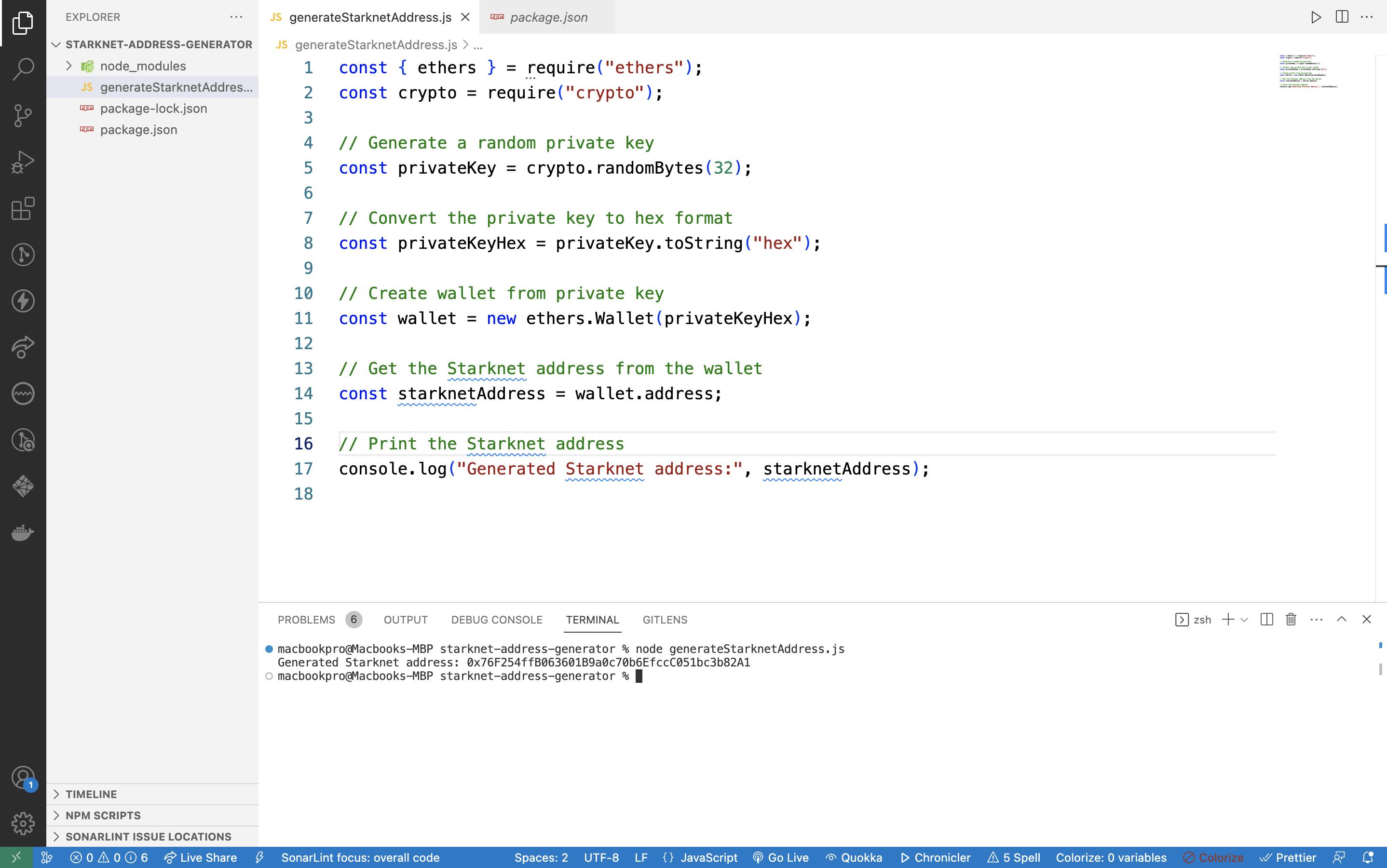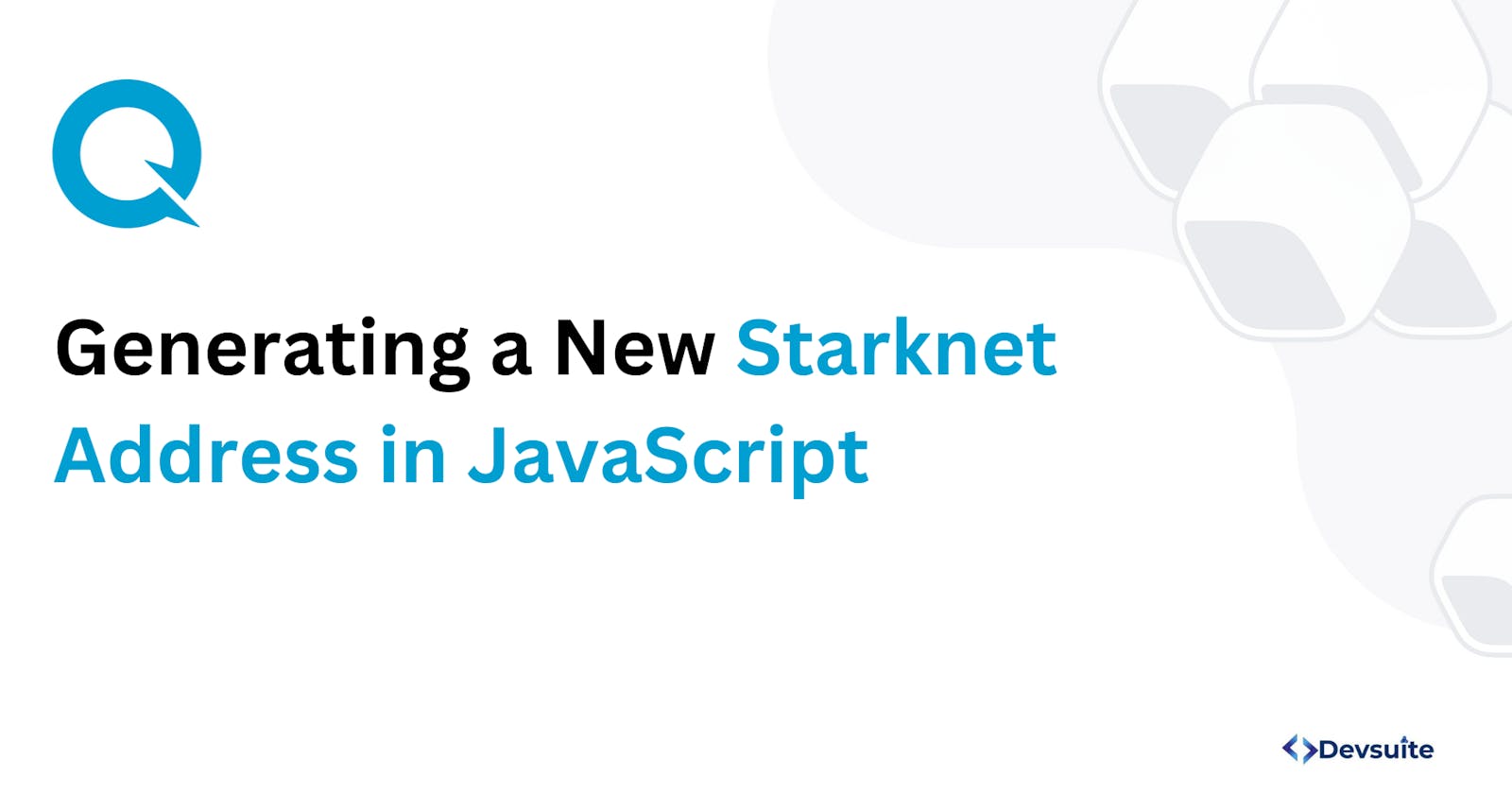Introduction
Starknet, developed by Starkware, is a Layer 2 scaling solution for Ethereum that aims to enhance scalability and privacy for decentralized applications (dApps). When interacting with Starknet, developers often need to generate new addresses for various purposes such as deploying contracts or managing assets. In this tutorial, we'll explore how to generate a new Starknet address programmatically in your JavaScript projects.
What is a Starknet Address?
A Starknet address is an Ethereum-compatible address used for interacting with the Starknet network. These addresses are derived from public and private keys and follow the same conventions as Ethereum addresses. They are used for deploying contracts, managing assets, and interacting with decentralized applications on Starknet.
What is the Ethers Library?
The ethers library is a JavaScript library for interacting with the Ethereum blockchain. It provides a wide range of functionalities, including generating wallets, signing transactions, and interacting with smart contracts. In this tutorial, we'll use the ethers library to create a new Starknet address.
How is a Starknet Address Generated?
Starknet addresses are generated similarly to Ethereum addresses. They are derived from a private key, which is a randomly generated 256-bit number. From this private key, a public key is computed using elliptic curve cryptography (ECC). The public key is then hashed using the Keccak-256 hashing algorithm to produce a 160-bit address, which is represented as a hexadecimal string. This hexadecimal string is the Starknet address.
Prerequisites
Before we begin, ensure you have:
Node.js: Node.js is a JavaScript runtime environment that allows you to run JavaScript code outside of a web browser. You can download and install Node.js from nodejs.org.
Basic understanding of Javascript
Installing Dependencies
To use the ethers library for generating Starknet addresses, you need to install it in your project. First, create a new directory for your project and navigate into it:
mkdir starknet-address-generator
cd starknet-address-generator
Then, initialize a new Node.js project by running:
npm init -y
Next, install the ethers library using npm:
npm install ethers
This will install the ethers library and its dependencies in your project directory.
Generating a Starknet Address
To generate a new Starknet address, we'll utilize cryptographic libraries to generate a random private key and then derive the corresponding public address.
QuickNode and Starknet: A Supercharged Alliance for dApp Development
Writing the JavaScript Code
Create a new JavaScript file named generateStarknetAddress.js in your project directory and write the following code:
const { ethers } = require("ethers");
const crypto = require("crypto");
// Generate a random private key
const privateKey = crypto.randomBytes(32);
// Convert the private key to hex format
const privateKeyHex = privateKey.toString("hex");
// Create wallet from private key
const wallet = new ethers.Wallet(privateKeyHex);
// Get the Starknet address from the wallet
const starknetAddress = wallet.address;
// Print the Starknet address
console.log("Generated Starknet address:", starknetAddress);
Explanation of the Code:
Import the
etherslibrary for Ethereum interaction.Import the
cryptomodule for cryptographic functionality.Generate a random 32-byte buffer as a private key.
Convert the random byte buffer into a hexadecimal string.
Create a new wallet instance using the hexadecimal private key.
Retrieve the Starknet address associated with the wallet.
Print the generated Starknet address to the console.
Running the Code
To run the code, execute the following command in your terminal:
node generateStarknetAddress.js
This will generate a new Starknet address and print it to the console.

Conclusion
In this tutorial, we've learned how to generate a new Starknet address programmatically in JavaScript using the crypto module for generating a random private key and the ethers library for creating the address. Starknet addresses are derived from randomly generated private keys and follow the same conventions as Ethereum addresses. By leveraging cryptographic libraries and the ethers library, developers can easily create new addresses for interacting with the Starknet network. These addresses can be used for deploying contracts, managing assets, and interacting with decentralized applications on Starknet. Incorporating address-generation functionality into your applications enables seamless integration with Starknet and enhances the development experience for building decentralized solutions.
Additional Resources
I'd love to connect with you on Twitter | LinkedIn | Instagram.
About QuickNode
QuickNode is dedicated to constructing the infrastructure necessary to uphold the forthcoming era of Web3. Since 2017, we've collaborated with numerous developers and organizations, facilitating the expansion of decentralized applications (dApps) and offering superior access to over 25 blockchains. Sign up for our newsletter to access further content similar to this and remain up-to-date with the latest developments in Web3!
